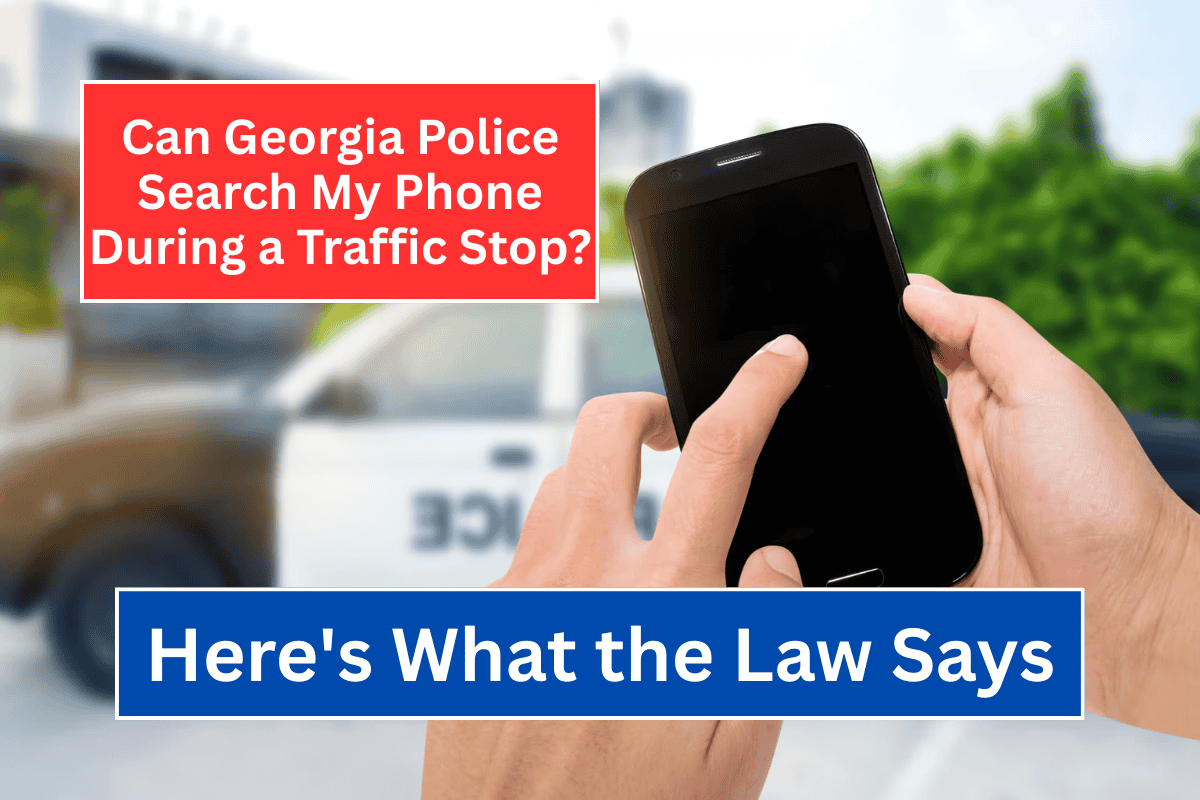In today’s digital age, smartphones store a massive amount of personal information, from texts and photos to access to bank accounts and social media.
It’s no surprise that people might wonder: if a police officer stops you during a traffic stop in Georgia, can they search your phone? Here’s an explanation of what the law says regarding phone searches by police officers during traffic stops.
U.S. Constitution and the Right Against Unreasonable Searches
Under the Fourth Amendment of the U.S. Constitution, citizens are protected from “unreasonable searches and seizures.” This means that police officers cannot search your person, vehicle, or property, including your phone, without a valid reason, such as a warrant or probable cause.
In the case of a routine traffic stop, unless an officer has probable cause or your consent, they generally cannot search your phone. Simply being pulled over for a traffic violation does not give law enforcement automatic permission to inspect the contents of your phone.
The Riley v. California Decision: A Key Legal Precedent
A major legal decision regarding phone searches came in 2014 with the U.S. Supreme Court case Riley v. California. This landmark ruling made it clear that police officers cannot search the contents of your smartphone without a warrant.
Even if the police seize your phone during an arrest, they still need a warrant to access your phone’s contents. The court recognized that modern smartphones hold vast amounts of personal data, and searching them without a warrant would violate privacy rights.
The Riley v. California decision solidified the understanding that smartphones are much more than just communication devices—they contain highly personal information that requires additional protection under the law.
Do Police Need a Warrant to Search My Phone?
Yes, in most cases, police cannot search your phone without a warrant. This includes situations where you’re pulled over during a traffic stop. The general rule is that police officers need probable cause and a warrant to search your phone, including emails, photos, text messages, and apps.
However, there are exceptions to this rule:
Consent: If you voluntarily consent to a search of your phone, law enforcement can search it without a warrant. However, you are not required to consent, and you can refuse the search if you choose to do so.
Search Incident to Arrest: Even if the police arrest you, they still need a warrant to search your phone’s contents, according to Riley v. California. However, if your phone is seized as evidence or part of an investigation, they can hold onto it until they obtain a warrant to search it.
Can Police Force You to Unlock Your Phone?
No, police cannot force you to unlock your phone using fingerprint or facial recognition technology without a warrant. While you might be required to unlock the phone voluntarily if you provide consent, the law does not allow police to compel you to use biometric data, like a fingerprint or face scan, to unlock your phone during an arrest or traffic stop without prior legal authorization.
However, law enforcement can request a warrant that specifically grants them the authority to compel the use of biometric access (like fingerprints or facial recognition) to unlock a phone if needed for the investigation.
What to Do During a Traffic Stop
If you’re pulled over in Georgia or any other state, you have the right to refuse any request to search your person, car, or phone. You also have the right to remain silent and not answer questions. However, remember that refusing consent to search does not necessarily mean you will avoid consequences if there is probable cause to search.
If the police do not have a warrant or your consent, they are generally not permitted to search your phone or access its contents during a routine traffic stop. If they ask to search your phone, you have the right to politely decline.
In Georgia, as well as throughout the United States, the law requires police officers to have a warrant or probable cause to search your phone. You have the right to refuse a search unless law enforcement has legal authorization.
The Riley v. California decision solidified the privacy protections for smartphones, making it clear that police cannot freely search the contents of your phone without proper legal procedures.
If you are ever in doubt during a traffic stop, you can respectfully assert your rights to refuse consent and, if necessary, consult with a legal professional.












